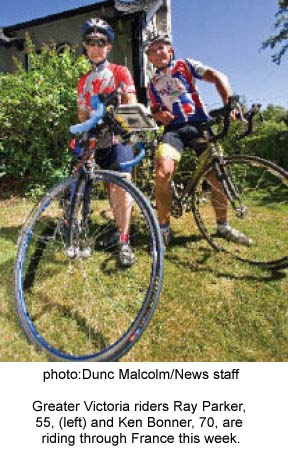|
Cyclists forego sleep for
marathon in France Aug 22, 2007 Ken Bonner is in France today, likely in pain, sleepless and promising himself, “If I finish this I will never do it again.” The 64-year-old Oak Bay cyclist is riding in the 1,200-kilometre randonneur tour that runs from Paris to the seaside city of Brest and back. He and about 4,000 other cyclists from around the world, including six Vancouver Islanders, all aim to finish in 90 hours or less. It’s Bonner’s fourth time cycling in the Paris-Brest randonnée. This time he plans to beat his best time of 59 hours and five minutes from 1991. “This is probably the last time I can do it fast because you start to lose muscle at my age,” Bonner said matter-of-factly. The randonnée happens once every four years and the biggest demographic is cyclists in their 40s. Dressed in spandex cycling gear, Bonner and one of his riding partners, Ray Parker, sat in the well-appointed living room of Bonner’s home. The natural light of the room danced on the ripples of their ultra-muscular biking legs. For Parker, 55, this is his first Paris-Brest randonnée. Cycling became an addiction for him early in his life, but a recurrence of oral cancer and a major operation this spring has added fuel to his passion. “I have a sense of urgency about wanting to live my life to the full,” the James Bay resident said. The operation to remove lymph nodes and part of his tongue happened just two weeks before one of the four qualifier races for the tour in France, Parker said with a laugh. “I’ll be happy if I come in under the time limit. But the faster I can do it, the happier I’ll be.” The bicyclists are clear the Paris-Brest ride is not a race. “It’s very much like touring with a time limit,” Parker said. “The spirit of randonneuring is that everyone who comes in under the time limit is a winner.” But Bonner admits, “It kind of gets competitive up front.” Those aiming for the best times have been known to remove directional arrows or turn them the wrong way, he said, and they will have vehicles meet them at the check-in points with supplies and food. Strict regulations prevent any rider from having a vehicle follow them. “It’s kind of like program management,” Bonner said, because each participant has to be able to plan for their own bike repairs, food, pain management, and sleep. That is, if they plan to sleep, which Bonner isn’t. There will be times, he anticipates, when he’ll want to quit. But his past randonnées have taught him stamina can return after stopping for a quick bite, getting a tailwind, or joining up with a new group of cyclists. When he feels like he can’t go on anymore, Bonner said, “The world can change in 10 or 15 minutes.” Source |
